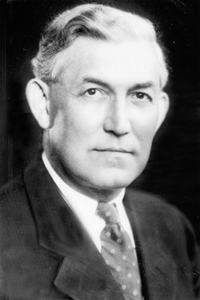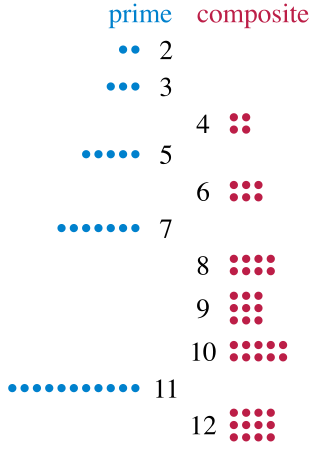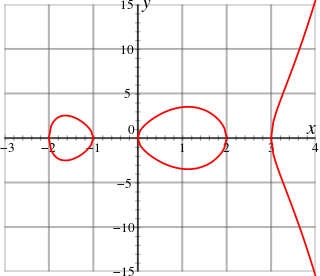External links
- Skula's homepage at Masaryk University
Ladislav "Ladja" Skula (born June 30, 1937) is a Czech mathematician. His work spans across topology, algebraic number theory, and the theory of ordered sets. He has published over 80 papers and notable results on the Fermat quotient.
He obtained his Dr.Sc. degree from Charles University in Prague with a thesis on "obor Algebra a teorie čísel" (On Algebra and Number Theory). In 1991, he was appointed professor at the Masaryk University in Brno, where he is now emeritus professor.

In number theory, a Carmichael number is a composite number , which in modular arithmetic satisfies the congruence relation:

A prime number is a natural number greater than 1 that is not a product of two smaller natural numbers. A natural number greater than 1 that is not prime is called a composite number. For example, 5 is prime because the only ways of writing it as a product, 1 × 5 or 5 × 1, involve 5 itself. However, 4 is composite because it is a product (2 × 2) in which both numbers are smaller than 4. Primes are central in number theory because of the fundamental theorem of arithmetic: every natural number greater than 1 is either a prime itself or can be factorized as a product of primes that is unique up to their order.
In number theory, a Wieferich prime is a prime number p such that p2 divides 2p − 1 − 1, therefore connecting these primes with Fermat's little theorem, which states that every odd prime p divides 2p − 1 − 1. Wieferich primes were first described by Arthur Wieferich in 1909 in works pertaining to Fermat's Last Theorem, at which time both of Fermat's theorems were already well known to mathematicians.
In number theory, a Wilson prime is a prime number such that divides , where "" denotes the factorial function; compare this with Wilson's theorem, which states that every prime divides . Both are named for 18th-century English mathematician John Wilson; in 1770, Edward Waring credited the theorem to Wilson, although it had been stated centuries earlier by Ibn al-Haytham.
In mathematics, in particular algebraic geometry, a moduli space is a geometric space whose points represent algebro-geometric objects of some fixed kind, or isomorphism classes of such objects. Such spaces frequently arise as solutions to classification problems: If one can show that a collection of interesting objects can be given the structure of a geometric space, then one can parametrize such objects by introducing coordinates on the resulting space. In this context, the term "modulus" is used synonymously with "parameter"; moduli spaces were first understood as spaces of parameters rather than as spaces of objects. A variant of moduli spaces is formal moduli. Bernhard Riemann first used the term "moduli" in 1857.
Invariant theory is a branch of abstract algebra dealing with actions of groups on algebraic varieties, such as vector spaces, from the point of view of their effect on functions. Classically, the theory dealt with the question of explicit description of polynomial functions that do not change, or are invariant, under the transformations from a given linear group. For example, if we consider the action of the special linear group SLn on the space of n by n matrices by left multiplication, then the determinant is an invariant of this action because the determinant of A X equals the determinant of X, when A is in SLn.
In abstract algebra, an adelic algebraic group is a semitopological group defined by an algebraic group G over a number field K, and the adele ring A = A(K) of K. It consists of the points of G having values in A; the definition of the appropriate topology is straightforward only in case G is a linear algebraic group. In the case of G being an abelian variety, it presents a technical obstacle, though it is known that the concept is potentially useful in connection with Tamagawa numbers. Adelic algebraic groups are widely used in number theory, particularly for the theory of automorphic representations, and the arithmetic of quadratic forms.

Nicholas Michael Katz is an American mathematician, working in arithmetic geometry, particularly on p-adic methods, monodromy and moduli problems, and number theory. He is currently a professor of Mathematics at Princeton University and an editor of the journal Annals of Mathematics.
In mathematics, geometric invariant theory is a method for constructing quotients by group actions in algebraic geometry, used to construct moduli spaces. It was developed by David Mumford in 1965, using ideas from the paper in classical invariant theory.

In mathematics, arithmetic geometry is roughly the application of techniques from algebraic geometry to problems in number theory. Arithmetic geometry is centered around Diophantine geometry, the study of rational points of algebraic varieties.
John K. S. McKay was a British-Canadian mathematician and academic who worked at Concordia University, known for his discovery of monstrous moonshine, his joint construction of some sporadic simple groups, for the McKay conjecture in representation theory, and for the McKay correspondence relating certain finite groups to Lie groups.

Paulo Ribenboim is a Brazilian-Canadian mathematician who specializes in number theory.

In mathematics, more specifically algebra, abstract algebra or modern algebra is the study of algebraic structures. Algebraic structures include groups, rings, fields, modules, vector spaces, lattices, and algebras over a field. The term abstract algebra was coined in the early 20th century to distinguish it from older parts of algebra, and more specifically from elementary algebra, the use of variables to represent numbers in computation and reasoning. The abstract perspective on algebra has become so fundamental to advanced mathematics that it is simply called "algebra", while the term "abstract algebra" is seldom used except in pedagogy.
In number theory, the Fermat quotient of an integer a with respect to an odd prime p is defined as
Harold Mortimer Edwards, Jr. was an American mathematician working in number theory, algebra, and the history and philosophy of mathematics.
In mathematics, a cyclically ordered group is a set with both a group structure and a cyclic order, such that left and right multiplication both preserve the cyclic order.
Lee Albert Rubel was a mathematician known for his contributions to analog computing.
Norman J. Pullman was a mathematician, professor of mathematics, and Doctor of Mathematics, who specialized in number theory, matrix theory, linear algebra, and theory of tournaments.